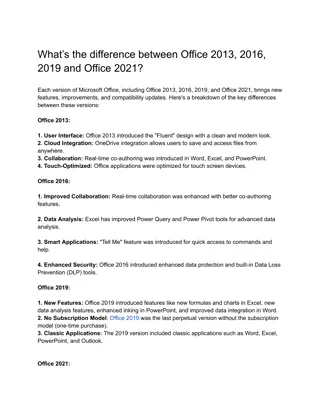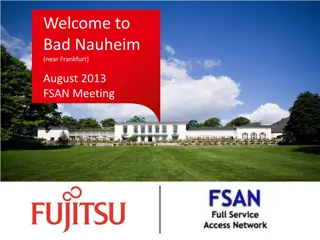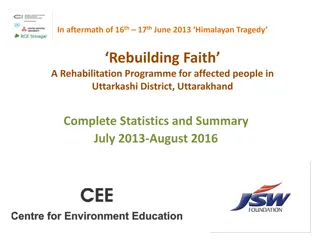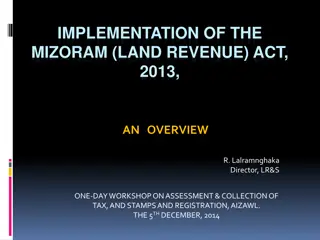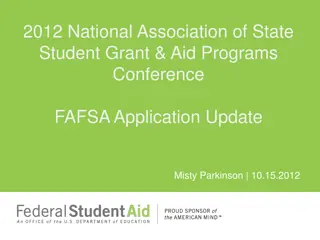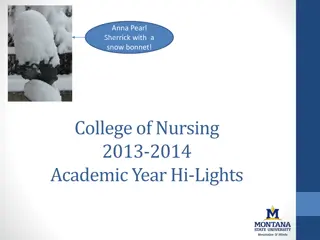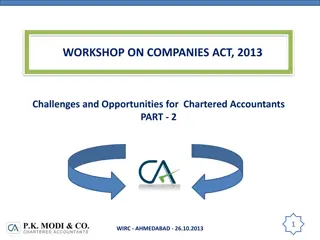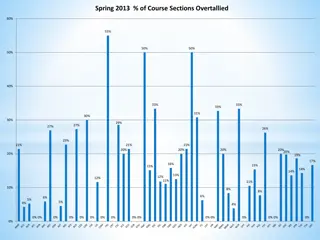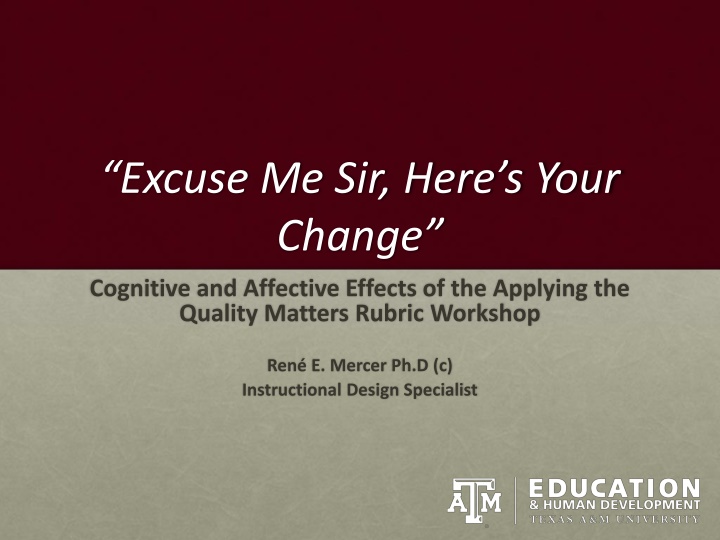
Impact of Quality Matters Rubric Workshop on Online Course Design
This study focuses on assessing the cognitive and affective effects of the Applying the Quality Matters Rubric workshop on faculty members. It aims to evaluate faculty knowledge of online course best practices, perception of course quality, and willingness to use the Quality Matters rubric. Results will inform future professional development plans for online faculty and suggest refinements for the workshop instrument. Professional development in online learning, QM-focused research, and the research problem and solution are discussed in detail.
Download Presentation

Please find below an Image/Link to download the presentation.
The content on the website is provided AS IS for your information and personal use only. It may not be sold, licensed, or shared on other websites without obtaining consent from the author. If you encounter any issues during the download, it is possible that the publisher has removed the file from their server.
You are allowed to download the files provided on this website for personal or commercial use, subject to the condition that they are used lawfully. All files are the property of their respective owners.
The content on the website is provided AS IS for your information and personal use only. It may not be sold, licensed, or shared on other websites without obtaining consent from the author.
E N D
Presentation Transcript
Excuse Me Sir, Heres Your Change Cognitive and Affective Effects of the Applying the Quality Matters Rubric Workshop Ren E. Mercer Ph.D (c) Instructional Design Specialist
Learning Objectives Discuss and evaluate an instrument used to measure faculty s knowledge of best practices in online course design; assess faculty s perception of online course quality and willingness to use the QM rubric. Identify methods used to maximize reliability of scores and provide evidence of content validity Identify cognitive and affective outcomes of faculty who completed the APPQMR workshop Interpret results to identify evidence of which of the QM standards the APPQMR training could provide the largest learning gains Use outcomes to inform future institutional plans for providing professional development for online faculty. Suggest options for future refinement and implementation of the instrument
Professional Development in Online Learning A large portion of faculty must design and deliver the courses they teach (Wright, 2012). Most online teachers are self-taught (Ray, 2009; Weaver, Robbie, & Borland, 2008) Professional Development increases confidence in online teaching (Powell, 2010; Wright, 2011) critical thinking skills in assessing online course quality (Reilly et al., 2012) Faculty s desire to improve online course quality (Reilly et al., 2012) More generalizable research is needed for professional development trainings focused on quality in online course design (Ellis & Phelps, 2000)
QM Focused Research Improved learning outcomes (Swan & Matthews, 2012) Increased self-efficacy (Wright, 2012) Improved quality of courses (Effken et al., 2009; Pollacia & McAllister, 2009; Swan & Matthews, 2012) Professional growth (Bento & White, 2010; Swan & Matthews, 2012) Increased student evaluation (Bento & White, 2010) QM Rubric is a useful tool (Effken et al., 2009; Reif, 2009)
Research Problem and Solution Problem: More studies are needed to determine the extent to which completing professional development workshops such as Quality Matters increase faculty knowledge of best practices in online course design, perception of online course quality, and willingness to use the QM rubric. Solution: Measure the effectiveness of one professional development workshop called Applying the Quality Matters Rubric (APPQMR) using criterion-based and self-report measures
Why APPQMR? Quality Matters is recognized nationally and world-wide Quality Matters flagship workshop Focuses solely on course design via the QM Rubric Quality in online learning begins with course design (Pollacia, Russell, & Russell, 2009; Swan & Matthews, 2012) Covers all 8 QM General Review Standards Workshop objective: Apply specific review standards of the QM rubric to an online course and make decisions as to whether the course meets the standards. Hands-on activities covering 21 specific review standards.
Research Question What are the effects of the Applying the Quality Matters Rubric (APPQMR) workshop on faculty s: a) knowledge of best practice in online course design b) perception of the quality of their own online course, and c) willingness to use the Quality Matters Rubric to redesign or design an online course?
RU VH Institution Faculty who design and deliver online courses Context Free workshop in online course design Face-to-Face (two-days) Campus wide Sponsored by College of Education & Human Development May 2013 Part of a larger Mixed- Methods study
One group Pre-Post Faculty who design and deliver online courses Methods & Procedures Online Pre-Questionnaire Available One week prior to workshop session Facilitate four sessions of the APPQMR workshop over 2 week period Post-Questionnaire Online After each second day session
Sample characteristics n = 25 Gender 16% Male 84% Female Race 8% Asian 12% African American 16% Hispanic 64% White Participants Roles Tenure/non-tenure track Adjunct Lecturers Staff
Part 1: Knowledgeof best practice in online course design (KBP) Nine theorized constructs 8 General Standards Alignment Instrumentation Three Part Questionnaire *28 questions 4 item multiple choice Part 2: Perception of online course quality (IPQ) *8 questions 4 point Likert scale Scale: Strongly disagree, disagree, agree, strongly agree, not sure (not scored) Part 3: Willingness to use QM Rubric (W) *6 questions 6 point Likert scale Scale: Strongly disagree, disagree, somewhat disagree, somewhat agree, agree, strongly agree
Sample Item Which of the following learning objectives is not written according to standards of best practice? a. Students will be able to understand the differences between theoretical research and applied research b. Students will write sentences that demonstrate correct use of commas, semicolons, and periods c. The student will be able to distinguish between characteristics of a square, a rhombus, and a rectangle d. Students will be able to describe the events that led to the American Civil War Part 1, General Review Standard 2
More Sample Items My course demonstrates a commitment to accessibility for all students Part 2, General Review Standard 8 If given adequate resources, I would be willing to work to use the Quality Matters rubric to ensure my online course met standards of quality assurance. Part 3, Willingness
Score Validity & Reliability Part 1: Knowledge of Best Practice in Online Course Design Content validity Three Quality Matters Experts provided formative content evaluation Expertise included varying levels of QM experience Score reliability Reliability of .690 (Cronbach s Alpha)
Data Analysis Computed average scores for dependent variables Accounted for missing data and not sure Syntax: Conducted Paired t-tests Calculated statistical significance at p < .01 Calculated Effect size ( 2) when appropriate
Results KBP Paired T-test was statistically significant p < .0001 2 = .43 IPQ & W Paired T-tests were not statistically significant p = .970 (IPQ) P = .555 (W) See handout for full results
Results per General Standard Note. Full table provided in handout. * Statistically significant result at p < .01.
Conclusions Providing professional development such as the APPQMR workshop can increase knowledge of best practices in online course design. Providing one professional development course such as APPQMR may not be sufficient in helping faculty assess the quality of their own courses Faculty who took the APPQMR workshop may have already been willing to use the QM rubric because they were not required to participate.
Increase sample size Focus on Knowledge of Best Practice Recommendations Use multiple institutions Use experimental or quasi- experimental designs Solomon four-group Refine the questions Avoid not and except Include more input from experts Repeat testing over multiple professional development offerings in Quality Matters

